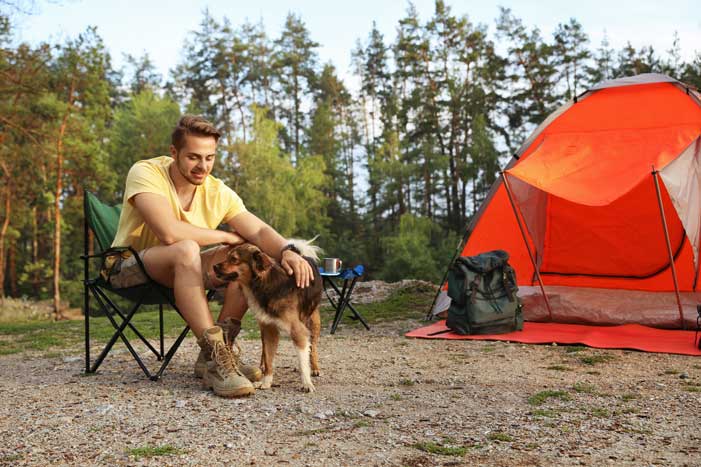If you’re thinking of enjoying the peace and tranquility of the great outdoors on a camping trip with the family and bringing your pet along, consider the following before you go.
Hiking and Safety Basics
Never leave your pet alone at the camp. The USDA Forest Service treats this as pet abandonment and will issue a violation. Always keep your pet leashed as state and county leash laws remain in effect while on National Forest System Lands. In addition, make sure your dog’s collar contains current tags. If you spend a lot of time camping with your pet, you may want to consider a GPS collar, as the technology is getting more affordable.
Flea and Tick Prevention

There are many types of ticks, and the most common can carry deadly disease, which is transmitted when the tick takes a blood meal from your pet. The symptoms of these diseases begin with a fever and lethargy, which should alert you to see your veterinarian. Chiggers are also common in Northern Arizona and are commonly found in the top layer of moist soil in areas of dense grass or brush. Chiggers feed on skin cells and their saliva produces a massive itchy reaction on our skin and that of our furry companions. Dogs tend to incessantly chew at their feet and limbs if they come in contact with chiggers. Many flea and tick preventatives, like NexGard, will provide adequate protection for your pets.
Don’t Drink the Water
Always bring plenty of water from home for your pet.

Puddles, ponds, cattle tanks, even running creeks and rivers should be avoided as drinking temptations for your pet. Water contaminants such as Campylobacter, Giardia and Cryptosporidium, can be the cause of vomiting and diarrhea. Leptospirosis is a bacteria which can live in warm stagnant water, and is spread in the urine of small mammals (like raccoons). It can be deadly as it primarily causes renal failure. If you spend a lot of time in the woods, and can’t keep your dog out of the water, an annual vaccination against lepto is recommended.
If this is your pet’s first time camping, you might want to get them acclimated to the outdoors at night by pitching a tent at home to help facilitate a smooth transition to the camp surroundings. Ask your veterinarian for other relevant camping tips before you go.

